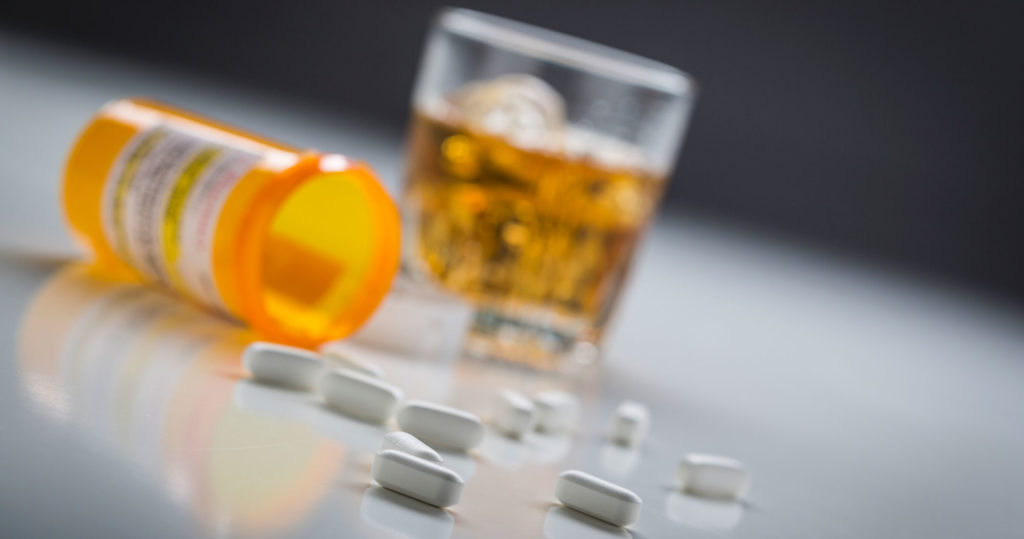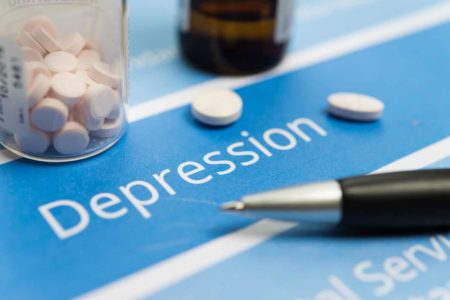Zoloft and Alcohol
What is Zoloft? Zoloft is one of the most popular SSRI antidepressants or anxiety meds in the United States. It is the brand name for sertraline, a drug that helps in depression treatment [1], obsessive-compulsive disorder (OCD treatment), panic attack treatment, anxiety disorder treatment, post-traumatic stress disorder (PTSD treatment), and premenstrual dysphoric disorder. In addition, doctors sometimes prescribe Zoloft off-label to treat eating disorders and insomnia. Zoloft withdrawal treatment will be able to help you in case you have developed a Zoloft dependency.
Alcohol and anxiety are common co-occurring disorders that can cause severe distress and impair your daily life. Anxiety and alcohol abuse often make each other significantly worse. Alcoholism can exacerbate an anxiety disorder or lead to new anxiety symptoms and vice versa. This means that a pre-existing anxiety disorder can contribute to alcoholism (as many people use alcohol as an unhealthy coping mechanism).
Anxiety meds, like Prozac, Paxil, Celexa, and Zoloft, known as selective serotonin uptake inhibitors (SSRIs) are commonly prescribed to patients suffering from anxiety [2]. These drugs work differently than anxiolytics by making the brain’s supply of serotonin more available, thus elevating one’s mood. Because they work differently in the brain and interact with alcohol differently, it has been shown that combining alcohol and anxiety meds like SSRIs can cause memory loss and lower your alcohol tolerance. While it may be true that the combination of alcohol and anxiety meds like SSRIs can feel good in the short term, over time, it can reduce the effectiveness of the medication and increase anxiety levels [3].

Get Help. Get Better. Get Your Life Back.
Searching for Accredited Drug and Alcohol Rehab Centers Near You?
Even if you have failed previously and relapsed, or are in the middle of a difficult crisis, we stand ready to support you. Our trusted behavioral health specialists will not give up on you. When you feel ready or just want someone to speak to about therapy alternatives to change your life call us. Even if we cannot assist you, we will lead you to wherever you can get support. There is no obligation. Call our hotline today.
(844) 597-1011Can I Drink Alcohol on Zoloft?
The short answer is no. Mixing Zoloft and alcohol is not safe. Zoloft and alcohol are both drugs that interact with your brain, and medical professionals recommend not to take Zoloft and alcohol simultaneously. This is because alcohol can increase the nervous system side effects of Zoloft, including drowsiness, dizziness, and difficulty concentrating. For this reason, it is recommended to avoid drinking alcohol while you are taking Zoloft, especially if you are planning to operate machinery or drive.
Drinking alcohol causes the Zoloft side effects to happen more intensely and quickly. Mixing Zoloft and alcohol can cause sedation, and drinking can intensify the drug’s sedative effects. This can make you feel drowsiness much faster than if you were drinking alcohol alone. Some people also experience an upset stomach when using this Zoloft. Mixing Zoloft and alcohol can worsen the symptoms of an upset stomach that may result in vomiting.
Frequent mixing of alcohol and anxiety meds like Zoloft can also cause people to develop side effects of the drug, such as weight gain, insomnia, and nausea. It is essential to mention that combining these anti-depressive drugs with alcohol can be a life-threatening mix resulting in a dangerous spike in blood pressure which can lead to cardiovascular problems.
Alcohol and Zoloft Interaction
Mixing Zoloft and alcohol can cause the antidepressant property of Zoloft to not work as well as it would on its own. Alcohol may allow the person to feel better in the short term. It may increase levels of depression and anxiety in the long run. Mixing Zoloft and alcohol can worsen alcohol cravings. People with certain types of serotonin receptors are more sensitive to stimulation.
SSRIs increase serotonin activity, triggering dopamine release and activating the brain’s reward pathway. Suppose alcohol is consumed while an SSRI induces this reaction. In that case, it can strengthen the association between alcohol and pleasure or in some cases, result in the formation of the association that was otherwise absent before.
Alcohol is a central nervous system (CNS) depressant that, by itself, can cause depression [4]. The abuse of alcohol can also worsen the symptoms of depression and make Zoloft less effective in treating these symptoms. This can increase suicidal thoughts and actions in people who drink alcohol when taking Zoloft. Therefore, if you have depression, your doctor will likely tell you not to drink alcohol, regardless of whether or not you are taking Zoloft.
Increased Side Effects of Mixing Zoloft and Alcohol
It’s best to avoid mixing Zoloft and alcohol. It may worsen your symptoms, and it can be dangerous and life-threatening.
If you mix Zoloft and alcohol:
You may feel more depressed or anxious.
- Drinking can counteract the benefits of your anxiety meds, making your symptoms more difficult to treat. Alcohol may seem to improve your mood in the short term, but its overall effect increases symptoms of depression and anxiety.
Side effects may be worse if you also take another medication.
- Many medications can cause problems when taken with alcohol, including anti-anxiety, sleep, and prescription pain medications. Side effects may worsen if you drink alcohol and take one of these drugs with an antidepressant.
You may be at risk of a dangerous reaction if you take MAOIs.
- When combined with certain alcoholic beverages and foods, anxiety meds called monoamine oxidase inhibitors (MAOIs) can cause a dangerous spike in blood pressure. If you take an MAOI, be sure you know what’s safe to eat and drink and which alcoholic beverages are likely to cause a reaction.
Your thinking and alertness may be impaired.
- The combination of Zoloft and alcohol will affect your judgment, coordination, motor skills, and reaction time more than alcohol alone. Some combinations may make you sleepy. This can impair your ability to drive or do other tasks that require focus and attention.
You may become sedated or feel drowsy.
- A few antidepressants cause sedation and drowsiness, and so does alcohol. However, when taken together, the combined effect can be intensified.
- Don’t stop taking an antidepressant or anxiety meds just so that you can drink. Most anxiety meds require a consistent, daily dose to maintain a constant level in your system and work as intended. Stopping and starting your medications can make your depression worse. While it’s generally best not to drink at all if you’re depressed, ask your doctor. If you have depression:
You may be at risk of alcohol abuse.
- People with depression are at increased risk of substance abuse and addiction. If you have trouble controlling your alcohol use, you may need treatment for alcohol dependence before your depression improves.
You may have trouble sleeping.
- Some people who are depressed have difficulty sleeping. Using alcohol to help you sleep may let you fall asleep quickly, but you tend to wake up more in the middle of the night.

Get Your Life Back
Find Hope & Recovery. Get Safe Comfortable Detox, Addiction Rehab & Dual Diagnosis High-Quality Care.
Hotline(844) 597-1011Increased Depression Caused by Mixing Zoloft and Alcohol
One possible side effect of Zoloft is increased depression and suicidal behavior. This is serious and can heighten when a person taking this medication also consumes alcohol. The interaction can cause depression, which may hinder the effectiveness of an antidepressant. The combined effects can make a suicide attempt more likely.
If you know someone at immediate risk of self-harm, suicide, or hurting another person:
- Ask the tough question: “Are you considering suicide?”
- Listen to the person without judgment.
- Call 911 or the local emergency number, or text TALK to 741741 to communicate with a trained crisis counselor.
- Stay with the person until professional help arrives.
- Try to remove any weapons, medications, or other potentially harmful objects.
Drinking alcohol isn’t recommended if you have depression. This is because alcohol suppresses neurological signals that can alter your ability to think and reason, so that drinking can worsen your condition. Heavy drinking can even lead to a downward spiral in your mental health. Remember, depression is more than just sadness.
Even if you take Zoloft for a condition other than depression, it still may not be safe for you to drink alcohol. You may still have the risk of increased depression from alcohol. This is because depression is a common symptom of other related health problems, such as OCD and PTSD, that Zoloft treats.

Extreme Intoxication Caused by Mixing Zoloft and Alcohol
Zoloft and alcohol are central nervous system depressants that slow or suppress brain activity. In combination, the two can cause oversedation. This can be dangerous, and in severe cases, it can cause slowed breathing, coma, and death. Also, alcohol and antidepressants can each cause drowsiness, reduced alertness, and uncoordinated movements when a person has both in their system, these effects increase, leading to accidents and injuries.
Reduced Effectiveness Caused by Mixing Zoloft and Alcohol
Those with depression should avoid alcohol because it will likely worsen their mental health and reduce the drug’s efficacy. Many of the side effects of alcohol occur when a person consumes the substance on a long-term basis. But they can also develop when a person starts mixing Zoloft and alcohol as part of a polydrug abuse problem because the medication intensifies the effects of the depressant.
First-class Facilities & Amenities
World-class High-Quality Addiction & Mental Health Rehabilitation Treatment
Rehab Centers TourRenowned Addiction Centers. Serene Private Facilities. Inpatient rehab programs vary.
Addiction Helpline(844) 597-1011Proven recovery success experience, backed by a Team w/ History of:
15+
Years of Unified Experience
100s
5-Star Reviews Across Our Centers
10K
Recovery Success Stories Across Our Network
- Low Patient to Therapist Ratio
- Onsite Medical Detox Center
- Comprehensive Dual-Diagnosis Treatment
- Complimentary Family & Alumni Programs
- Coaching, Recovery & Personal Development Events
Risk Of Overdose Caused by Mixing Zoloft and Alcohol
Can you overdose from mixing Zoloft and alcohol? Yes, you can overdose on Zoloft and alcohol. Zoloft and alcohol death can happen when they’re taken in high doses, as when an individual uses an intoxicating amount of any drugs or substance to the point where their body reacts or shuts down, which would be regarded as a drug or substance overdose. Typical drug overdose symptoms include decreased or increased body temperature, unresponsiveness or loss of consciousness, abnormal breathing, changes in skin color (bluish tint to the skin or pale), and abnormal heart rate.
Liver Damage Caused by Mixing Zoloft and Alcohol
If a person taking antidepressants consumes too much alcohol, their liver may be unable to process the toxins. This can result in toxicity or liver damage. Moreover, alcohol is also known to cause liver damage, and heavy drinking mixed with drug use can worsen these problems. Individuals taking prescription drugs are often told to avoid alcohol to avoid consequences like alcohol cirrhosis and alcoholic hepatitis.
Alcohol and Zoloft Blackouts Caused by Mixing Zoloft and Alcohol
Alcohol blackouts, or temporary losses of memory, can result from excessive alcohol consumption and can occur in anyone of any age or level of alcohol experience who drinks alcohol. Alcohol and Zoloft-induced blackouts refer to “gaps” in a person’s memory for events that occurred while intoxicated.
Symptoms that may occur are similar to symptoms of intoxication and may include:
- Dizziness
- Headaches
- Muscle spasms
- Vision changes
- Difficulty speaking
Can You Die From Mixing Zoloft and Alcohol?
In today’s culture, more people are struggling with substance abuse. Different legal and illegal substances can be dangerous, especially when combined. One such combination is Zoloft and Alcohol, a common concoction that causes side effects that individuals are not always aware of. Zoloft and alcohol can be a dangerous combination. Taking Zoloft alone, as prescribed, risks and side effects can still occur. Naturally, combining this with an intoxicating substance such as alcohol enhances the risks and side effects, including overdose that may lead to death.
Can Zoloft and Alcohol Kill You?
Can Zoloft and alcohol kill you? In a frightening 2014 study, researchers said 100 of 201 people experienced severe disinhibition while mixing SSRIs and alcohol. Eight people killed others, and some were killed more than once. Overall, 12 people died.
Dual Diagnosis Depression and Alcoholism Treatment
Mixing alcohol and antidepressants like Zoloft is a big NO. Remember that both Zoloft and alcohol are addictive, and mixing them can worsen Different substances, legal and illegal, can be dangerous, especially when combined. Professional medical help should be tried out at once if one has seen addiction to Zoloft or alcohol, or both.
There is a strong link between anxiety meds like Zolof, mental health conditions such as depression and anxiety, and alcohol abuse. Individuals who struggle with mood disorders like depression and anxiety are more susceptible to developing an addiction to drugs or alcohol, often to self-medicate symptoms of their underlying mental health condition. These co-occurring disorders can make each other worse without proper Zolof withdrawal treatment.
To determine the most effective ways to treat alcohol and anxiety med addiction, getting an accurate assessment of all the symptoms is crucial. When a mental health professional has evaluated the symptoms, it may be determined that another form of mental condition is present and needs a particular treatment. Very often, some combination of psychotherapy, medication, and lifestyle changes are effective for coping with functional.

Zoloft and Alcohol Detox Treatment
Medical detox is weaning someone off of prescription drug and alcohol dependency. It allows members of centers like We Level Up to recover safely and comfortably. While an uncomfortable withdrawal from alcohol and Zoloft is unavoidable, it doesn’t have to be unbearable.
Medical detox is often considered the first stage of treatment. It will help you navigate the complicated withdrawal from alcohol and Zoloft but doesn’t address patterns of thought and behavior contributing to drug use. Various treatment approaches and settings can help provide the ongoing support necessary to maintain long-term sobriety after you complete detox.
Cravings are very common during detox and can be challenging to overcome. This often leads to relapse. Constant medical care provided during inpatient treatment helps prevent relapse. Clinicians can give necessary medication and medical expertise to lessen cravings and withdrawal effects from alcohol and Zoloft.
World-class, Accredited, 5-Star Reviewed, Effective Addiction & Mental Health Programs. Complete Behavioral Health Inpatient Rehab, Detox plus Co-occuring Disorders Therapy.
CALL(844) 597-1011End the Addiction Pain. End the Emotional Rollercoaster. Get Your Life Back. Start Drug, Alcohol & Dual Diagnosis Mental Health Treatment Now. Get Free No-obligation Guidance by Substance Abuse Specialists Who Understand Addiction & Mental Health Recovery & Know How to Help.
Inpatient Alcohol and Drug Rehab
There isn’t one treatment approach or style that will suit everyone. Treatment should speak to the needs of the individual. Inpatient drug and alcohol rehab and addiction treatment aren’t just about drug and alcohol use. the goal is to help the patient stop using Zoloft and alcohol and other substances. Zoloft and alcohol rehab should also focus on the whole person’s needs.
Addiction is a complex but treatable disease that affects brain function and behavior. When someone or their family is considering different treatment facilities, they should account for the complexity of addiction and the needs of the individual. The objective of attending an inpatient drug and alcohol rehab center for addiction treatment is to stop using the drug and re-learn how to live a productive life without it.
Following a full medical detox from Zoloft and alcohol, most people benefit from inpatient rehab. Inpatient drug rehab can last anywhere from 28 days to several months. Patients stay overnight in the rehab facility and participate in intensive treatment programs and therapy. Once someone completes rehab, their addiction treatment team will create an aftercare program, including continuing therapy and participation in a 12-step program like Alcoholics Anonymous and Narcotics Anonymous.
Psychotherapy
Many rehab programs will also have early morning classes or programs. Group sessions occur during inpatient rehab, as do individual therapy sessions. Family therapy may be part of inpatient rehab when it’s feasible. Alternative forms of therapy may be introduced during inpatient rehab, like a holistic therapy program, yoga for addiction recovery, or addiction treatment massage therapy.
Several different modalities of psychotherapy have been used in the treatment of mental health disorders along with addiction, including:
- Cognitive Behavioral Therapy (CBT) – is an effective treatment that involves changing both the patterns of negative thoughts and the behavioral routines which are affecting the daily life of the depressed person for various forms of depression.
- Dialectical Behavioral Therapy – is a comprehensive mental health and substance abuse treatment program whose ultimate goal is to aid patients in their efforts to build a life worth living. The main goal of DBT is to help a person develop what is referred to as a “clear mind.”
- Solution-focused therapy is an approach interested in solutions that can be quickly implemented with a simple first step leading to further positive consequences.
Experience Transformative Recovery at We Level Up Treatment Centers.
See our authentic success stories. Get inspired. Get the help you deserve.
Start a New Life
Begin with a free call to an addiction & behavioral health treatment advisor. Learn more about our dual-diagnosis programs. The We Level Up Treatment Center Network delivers recovery programs that vary by each treatment facility. Call to learn more.
- Personalized Care
- Caring Accountable Staff
- World-class Amenities
- Licensed & Accredited
- Renowned w/ 100s 5-Star Reviews
We’ll Call You
Dual Diagnosis Treatment
Drug abuse and mental health disorders often co-occur. In many cases, traumatic experiences can result in a mental health disorder and substance abuse. Dual diagnosis rehabilitation treats both of these issues together. The best approach for the treatment of dual diagnosis is an integrated system. This strategy treats both the substance abuse problem and the mental disorder simultaneously. Regardless of which diagnosis (mental health or substance abuse problem) came first, long-term recovery will depend mainly on the treatment for both diseases done by the same team or provider.
Medication Assisted Treatments (MAT)
Medication-Assisted Treatments (MAT) for substance use and mental health disorders are commonly used in conjunction with one another. This includes the use of medications and other medical procedures. During your rehab, the staff from your treatment facility will help you identify what caused your addiction and teach you skills that will help you change your behavior patterns and challenge the negative thoughts that led to your addiction. Sometimes, the pressures and problems in your life lead you to rely on substances to help you forget about them momentarily.
Please, do not try to detox on your own. The detox process can be painful and difficult without medical assistance. However, getting through the detox process is crucial for continued treatment. We Level Up provide proper care with round-the-clock medical staff to assist your recovery through our opioid addiction treatment program medically. So, reclaim your life, and call us to speak with one of our treatment specialists. Our counselors know what you are going through and will answer any of your questions.
Drug and Alcohol Rehab Near Me
Drug and alcohol addiction is a condition that can cause major health problems, such as an overdose. We Level Up rehab treatment & detox center can provide you, or someone you love, the tools to recover from this with professional and safe treatment. Feel free to call us to speak with one of our counselors. We can inform you about this condition and give you clarity about issues like alcohol and Zoloft withdrawal symptoms. Our specialists know what you are going through. Please know that each call is private and confidential.

Sources:
[1] NIDA – https://www.drugabuse.gov/publications/drugfacts/prescription-cns-depressants
[2] FDA – https://www.accessdata.fda.gov/drugsatfda_docs/label/2016/019839S74S86S87_20990S35S44S45lbl.pdf
[4] SAMHSA – https://store.samhsa.gov/sites/default/files/d7/priv/sma12-4688.pdf
[5] Zoloft Side Effects, Withdrawal, And Effective Treatment (welevelupnj.com)


